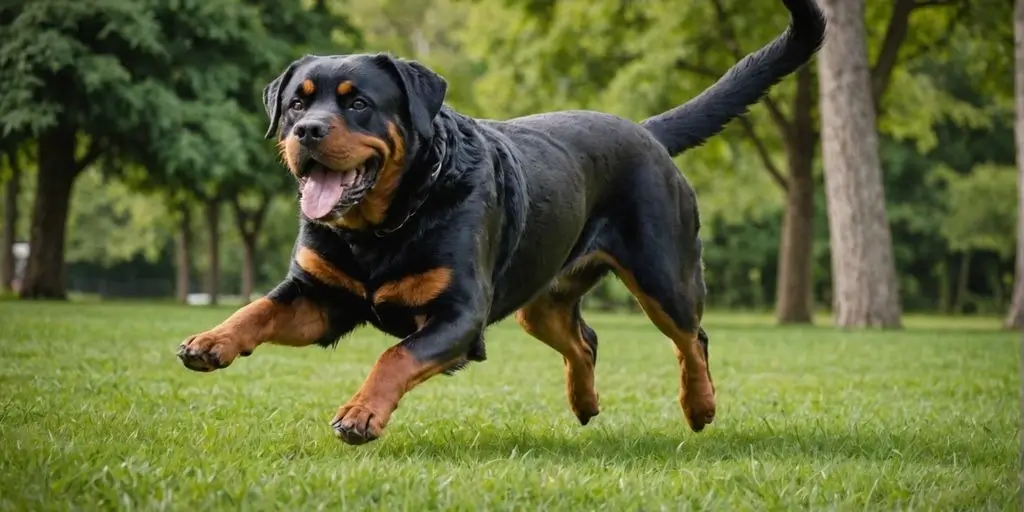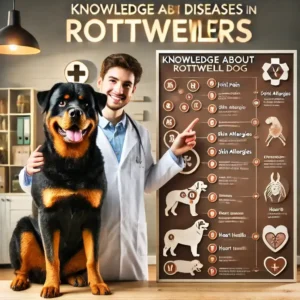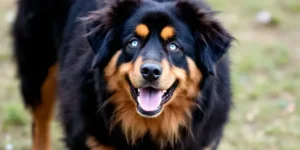Exercise Needs of a Rottweiler Breed Guide: Fun Facts and Training Tips
Rottweilers are solid and enthusiastic canines that require a bounty of workouts to remain cheerful and solid. Understanding the Exercise Needs of a Rottweiler is critical to keeping them in great shape.
This direction will assist you in learning about the distinctive sorts of exercises and schedules that can keep your Rottweiler fit and mentally sharp.
Key Takeaways
- Rottweilers require at least 1 to 2 hours of exercise daily, incorporating strolls, play, and more severe exercises, making them dogs that require consistent activity.
- Mental incitement is as critical as a physical workout to keep Rottweilers from getting bored and creating awful behaviors, making proper socialization essential.
- Open-air exercises like climbing, swimming, and pooch sports are extraordinary ways to keep your Rottweiler dynamic and locked in, ensuring they get enough exercise to stay healthy.
- Recess should be an adjusted blend of fun and preparation to assist your Rottweiler to remain sharp and well-behaved, ensuring they get enough playtime.
- A solid, slim underpins your Rottweiler’s exercise needs, so consult a vet to select the correct commercial dog food for optimal health and temperament, ensuring your Rottweiler dog breed thrives.
Day-by-Day Workout Prerequisites for Rottweilers.
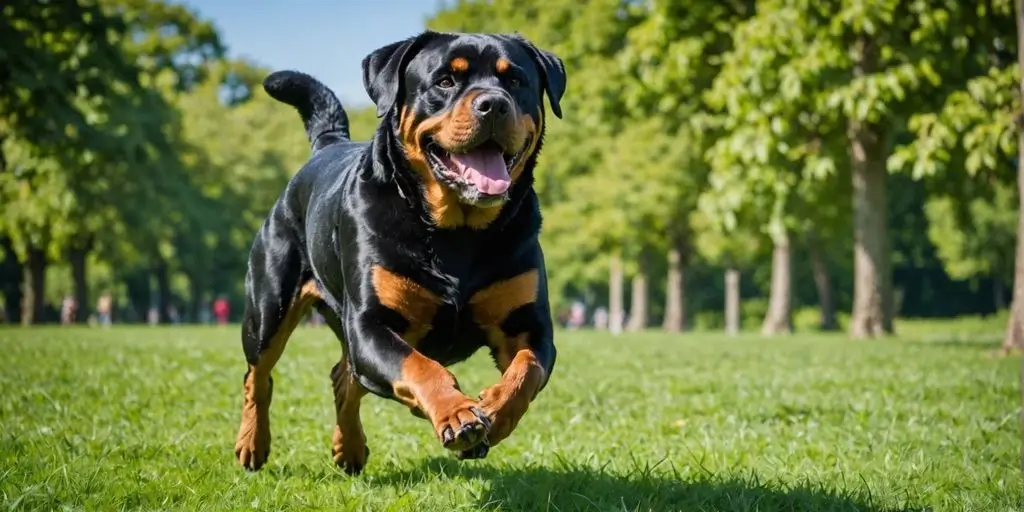
Rottweilers are a dynamic breed that needs significant workouts to remain upbeat and sound, and proper socialization is key to their development. They should ideally get at least 1.5 to 2 hours of workout each day.
This will incorporate exercises such as brisk walking, running, and two hours of exercise in a safely fenced zone, along with rationally fortifying diversions.
Mental Incitement for Rottweilers
Rottweilers are not only physically dynamic but exceedingly intelligent mutts that require mental challenges to remain cheerful and solid, ensuring they socialize well.
Mental incitement is as imperative as a physical workout to avoid boredom and undesirable behaviors, especially for a working dog.
Significance of Mental Incitement
Keeping Rottweiler’s intellect locked in is pivotal to their socialization and well-being, especially for dogs that require mental stimulation. Without sufficient mental workouts, they can become eager and create dangerous propensities, which is why Rottweilers need regular engagement.
Locks in their minds make a difference, and they remain sharp and substantive.
Intuitive Toys and Games
Intelligent toys and diversions are excellent for providing mental stimulation and can help with socialization during playtime. Here are a few exercises to undertake along with your pooch to keep them engaged and active indoors and outdoors.
Perplex: Toys challenge your pooch to think and fathom issues to induce a treat.
Nose work diversions: Cover up treats around the house and let your dog discover them utilizing their sense of scent.
Preparation sessions: Brief visit preparation sessions with a leash can keep your canine locked in and help them learn.
Preparing for Sessions
Preparing for sessions is an incredible way to supply mental workouts and help your Rottweiler socialize with other dogs. Rottweilers adore memorizing modern commands and traps, which can enhance their training as working dogs.
Keep sessions brief and fun to preserve their interest. This not only fortifies their intellect but also reinforces your bond with them.
Part of Slim Down in Support of Workout
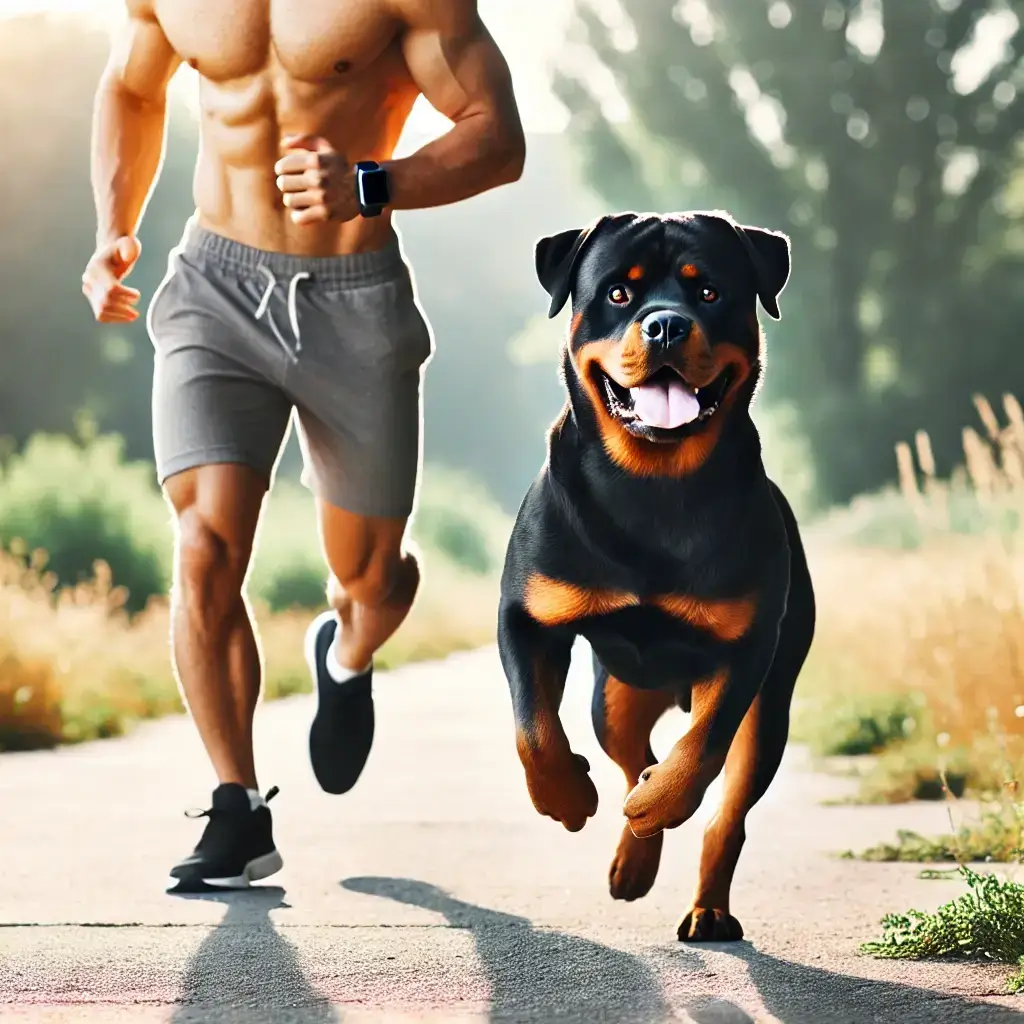
Wholesome Exercise Needs of a Rottweiler
A well-rounded slim down gives your Rottweiler the essential supplements to remain sound and enthusiastic, supporting their active lifestyle as a working dog and ensuring they have the energy for lots of exercise.
Bolstering your Rottweiler with a high-quality, adjusted meal is less appropriate for their age, estimate, and activity level is pivotal. Dynamic puppies require a diet less protein-rich to back muscle improvement and support, as many Rottweilers are generally prone to weight gain.
In addition, vitamins, minerals, and omega-3 fatty acids are critical for ideal skin, coat, and joint health, especially in working dogs prone to arthritis.
Choosing the Proper Food
When selecting a diet for your Rottweiler, seek high-quality, animal-based protein sources.
Dodge nourishment with fillers, byproducts, and manufactured added substances. It’s imperative to control portions to avoid weight gain, as Rottweilers are inclined to pick up weight, particularly when left alone for long periods.
Counseling with your veterinarian can assist you in deciding on suitable parcel sizes and dietary necessities based on your dog’s age, weight, and activity level.
Counseling a Veterinarian
Scheduling veterinary care is vital for maintaining the health of your dog alone. Many conditions are more effectively treated within the early stages, and customary check-ups increase the chances of early discovery. You’ll be able to take preventive measures.
Maintaining a solid weight and getting standard orthopedic evaluations are vital for giant breeds such as Rottweilers to preserve joint well-being, especially in their paws.
Common Exercise Needs of a Rottweiler
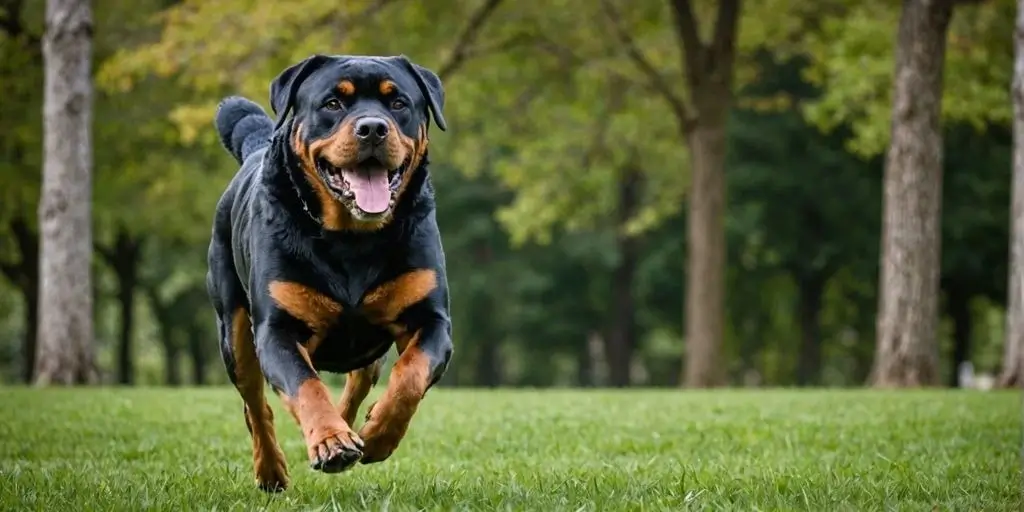
Rottweiler Breed Guide
The Rottweiler is a breed that is both confident and calm, known for its courageous temperament and protective instincts. These dogs were historically used as guard dogs and have also found roles as search-and-rescue dogs due to their intelligence and trainability. However, owning a Rottweiler comes with specific responsibilities, particularly regarding their health and training.
Common Health Concerns
While Rottweilers are generally healthy, they can be prone to certain health issues. Common concerns include hip dysplasia, gastric torsion (also known as gastric dilatation-volvulus), and eye conditions such as cataracts. It’s important to recognize these potential health risks early on. Regular vet check-ups are essential, and a vet’s top tip is to keep an eye on your Rottweiler’s skin and coat, as well as their overall weight and activity level.
Life Expectancy and Care
Rottweilers typically have a life expectancy of around 8 to 12 years. To ensure your Rottweiler lives a long and healthy life, it is crucial to provide them with plenty of exercise and a well-balanced diet. Feeding your dog high-quality food designed for large breeds is important to provide the proper nutrition for their health. Rottweilers are known to be loyal companions and thrive on strong bonds with their owners, so spending quality time with them is vital.
Grooming Needs
Rottweilers have a double coat that requires regular grooming to keep it in good condition. It’s important to keep their coat clean and free of mats. Regular brushing will help manage shedding and maintain skin health.
Recognizing the Signs of Overexertion
Rottweilers are lively mutts, but it’s vital to know when they’ve had as much workout to prevent strain on their joints and potential arthritis.
Signs of overexertion include intemperate gasping, dribbling, and difficulty strolling, which are important to monitor when you get a Rottweiler. If your puppy appears in any of these signs, it’s time to request a break for a paw massage.
Avoid Joint Issues
Joint issues like hip and elbow dysplasia are common in Rottweilers, which is why it’s essential to groom them regularly to check for any signs of discomfort, especially in their paws. To assist avoid these issues, maintain a strategic distance from high-impact exercise, and make beyond any doubt your pooch keeps up a sound weight to prevent arthritis, especially in a year-old Rottie.
Regular vet check-ups can capture early signs of joint issues.
Custom Veterinary Check-ups
Scheduling vet visits is important for keeping your Rottweiler sound and checking for any retinal issues, such as progressive retinal atrophy, especially since many Rottweilers are generally prone to health issues. During these check-ups, your vet can screen for any exercise-related well-being issues. And give directions on keeping your puppy in the best shape to prevent problems common in police dogs.
Conclusion
In outline, Rottweilers are enthusiastic and shrewd mutts that require an adjusted blend of physical workout and mental incitement to stay cheerful and solid, making them easy to train with the right guidance. Customary exercises like strolls, recess, and preparation sessions are essential to meet their workout needs and anticipate boredom.
A well-rounded diet and scheduled veterinary care are pivotal to their well-being and temperament, especially for Rottweilers who need much exercise to stay healthy. Understanding and assembling these needs guarantees that your Rottweiler remains a faithful, cherished, and well-behaved companion, reflecting a good temperament.
With proper care and consideration, your Rottweiler will flourish and bring delight, showcasing its excellent temperament.
Frequently Asked Questions
Grown-up Rottweilers require at least 1 to 2 hours of work out each day. This will incorporate strolls, recess, and other physical exercises.
Rottweilers appreciate long strolls, climbing, swimming, getting, and pooch sports things like nimbleness and acquiescence preparation.
Mental incitement avoids boredom and undesirable behaviors. It keeps their minds sharp and locked in.
You’ll utilize confused toys, intelligently recreations, and standard preparing sessions to keep your Rottweiler rationally fortified.
Puppies require age-appropriate exercises. Brief play sessions and delicate strolls are perfect to maintain a strategic distance from overexertion.
A balanced slim down gives basic supplements to keep your Rottweiler sound and lively. Consult a vet to select the proper nourishment.
